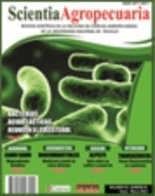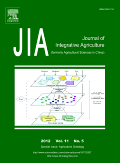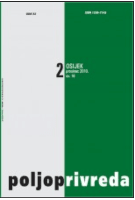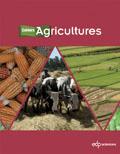
Journal of Agricultural Sciences-Tarim Bilimleri Dergisi
Scope & Guideline
Connecting Scholars to Transform Agricultural Practices
Introduction
Aims and Scopes
- Sustainable Agricultural Practices:
The journal emphasizes research that promotes sustainable agricultural methods, including organic farming, agroecology, and the use of biofertilizers and biopesticides. - Technological Innovations in Agriculture:
There is a strong focus on the application of technology in agriculture, such as machine learning, image processing for disease detection, and the use of drones for precision agriculture. - Plant Physiology and Biochemistry:
Research on plant responses to abiotic stresses (e.g., salinity, drought) and the biochemical pathways involved in stress tolerance is a key area of focus. - Food Science and Quality Assessment:
The journal covers studies related to food processing, quality evaluation, and the nutritional analysis of agricultural products. - Environmental Impact Studies:
Research examining the environmental impacts of agricultural practices, including soil health, water usage, and the effects of climate change on agriculture is prominently featured. - Genetic Diversity and Crop Improvement:
The journal publishes studies on genetic diversity, breeding techniques, and the development of new crop varieties with improved traits. - Pest and Disease Management:
Research on integrated pest management (IPM) strategies and disease control methods, including the use of biological control agents, is a significant area of interest.
Trending and Emerging
- Nanotechnology in Agriculture:
Recent publications have shown a rising interest in the application of nanotechnology for enhancing agricultural productivity, including the use of nanoparticles for disease control and soil health improvement. - Precision Agriculture and Smart Farming:
There is a growing trend towards research in precision agriculture, utilizing technologies such as IoT (Internet of Things), remote sensing, and big data analytics to optimize farming practices. - Climate Resilience and Adaptation Strategies:
Research focused on developing strategies for climate resilience in agriculture is increasingly prominent, addressing the urgent need for adaptation in the face of climate change. - Health and Nutrition in Agriculture:
Emerging studies are exploring the link between agriculture and public health, particularly in relation to the nutritional quality of food and dietary impacts. - Biodiversity and Ecosystem Services:
There is an increasing focus on the role of biodiversity in agricultural systems and its contribution to ecosystem services, highlighting the importance of maintaining diverse agricultural landscapes.
Declining or Waning
- Traditional Agricultural Practices:
Research focusing solely on conventional farming methods has seen a decline as the journal increasingly prioritizes innovative and sustainable practices. - Chemical Fertilizers and Pesticides:
There is a noticeable decrease in studies centered around the use of synthetic fertilizers and pesticides, likely due to the growing emphasis on organic and environmentally friendly alternatives. - Single-Crop Systems:
Research on monoculture practices is waning, reflecting a broader trend towards advocating for crop rotation and intercropping systems to enhance biodiversity and soil health.
Similar Journals

AGROCIENCIA
Elevating research to meet the challenges of agriculture.AGROCIENCIA, published by COLEGIO POSTGRADUADOS, is a key journal in the fields of agronomy, animal science, and environmental science in Mexico. With an ISSN of 1405-3195 and an E-ISSN of 2521-9766, this journal has been a crucial platform for disseminating research findings since its inception in 2000. Operating from Montecillo, Estado Mexico, it provides an outlet for scholars and practitioners to share innovations and insights that directly impact agricultural practices and environmental sustainability. Despite its current categorization in the Q4 quartile across multiple disciplines, AGROCIENCIA strives to elevate the quality and reach of research, fostering a collaborative approach to tackle pressing issues within the agricultural sciences. Access options are primarily through institutional subscriptions, allowing for a diverse audience of researchers, professionals, and students to engage with the latest studies aimed at advancing knowledge in the agricultural sector. As the journal converges towards its 2024 milestone, it remains dedicated to enhancing scientific inquiry and promoting effective solutions within its discipline.

Legume Research
Exploring the Vital Role of Legumes in AgricultureLegume Research, published by the AGRICULTURAL RESEARCH COMMUNICATION CENTRE in India, is an essential peer-reviewed journal focusing on advancements in the field of agronomy, crop science, soil science, and plant science. With an ISSN of 0250-5371 and operating since 2008, this journal caters to researchers, agricultural professionals, and students interested in the critical role of legumes in sustainable agriculture and food security. It ranks within the third quartile (Q3) in several prominent categories, reflecting its contribution to the agricultural and biological sciences community—ranking #279 in Agronomy and Crop Science, #113 in Soil Science, and #376 in Plant Science based on Scopus metrics. Although not open access, Legume Research remains a vital resource for those seeking to enhance their knowledge and contribute novel research findings in the ever-evolving discipline of legume cultivation and utilization. With a clear objective to disseminate impactful research, this journal significantly contributes to the global understanding of legumes' ecological, economic, and nutritional importance.

Scientia Agropecuaria
Exploring new frontiers in agricultural sciences from Trujillo, Peru.Scientia Agropecuaria, an esteemed journal published by the Universidad Nacional de Trujillo’s Faculty of Agricultural Sciences, is dedicated to advancing research in the fields of Agronomy, Animal Science, and Soil Science. With a rich heritage since its inception, the journal has embraced Open Access since 2010, ensuring global dissemination of knowledge to researchers and practitioners. Hailing from Trujillo, Peru, it plays a vital role in the scientific community, capturing a Q3 ranking across multiple categories in the 2023 category quartiles, which reflects its growing influence, supported by its commendable Scopus percentile rankings. The scope of the journal is to publish original research, reviews, and insights that address critical issues and innovations in agriculture and related fields, making it a key resource for researchers, professionals, and students aiming to stay abreast of cutting-edge developments. As the journal continues its convergence until 2024, it remains an important platform for impactful contributions to the agricultural sciences.

TROPICAL AGRICULTURE
Cultivating knowledge for sustainable development in agriculture.Tropical Agriculture is a reputable journal dedicated to advancing knowledge and research in the fields of Agronomy and Development, with a particular emphasis on tropical farming practices and agricultural innovation. Published by the University of the West Indies, this journal serves as a crucial resource for researchers, professionals, and students engaged in the complexities of agriculture in the tropics. Established in 1979, it has witnessed significant contributions and continues to facilitate scholarly discussions through its quarterly publications. While the journal currently holds a Q4 ranking in both the Agronomy and Development categories, its commitment to fostering research excellence positions it as a pivotal platform for emerging studies and regional agricultural advancements. Although not an open-access publication, it provides critical insights and localized research that greatly benefit the agricultural community, particularly within the Caribbean context. Researchers and professionals in the field can rely on this journal for insightful content on tropical agricultural challenges and developments, enhancing knowledge dissemination and application across related disciplines.

Revista Fitotecnia Mexicana
Exploring the Depths of Plant Science and GeneticsRevista Fitotecnia Mexicana is a prominent academic journal published by the SOC MEXICANA FITOGENETICA, dedicated to advancing knowledge in the fields of agronomy, crop science, genetics, horticulture, and plant science. With its establishment dating back to 2007 and currently running through 2024, this journal serves as an important platform for researchers, professionals, and academic institutions interested in plant genetic resources and agricultural innovations. Although it holds a Q4 quartile ranking in various categories and is positioned within the lower percentiles in Scopus rankings, it provides crucial insights and opportunities for emerging ideas and local research initiatives. Based in Mexico, and with its indexed ISSN 0187-7380, the journal plays an important role in stemming from the rich agricultural heritage of the region. The lack of open access options underscores the depth of curated content provided, making it a valuable resource for professionals seeking to expand their expertise in the sector.

Journal of Integrative Agriculture
Connecting Disciplines for a Sustainable Agricultural FutureJournal of Integrative Agriculture, published by Elsevier Science Ltd, stands as a leading platform for innovative research at the intersection of agricultural sciences. With a significant focus on integrative approaches, this journal has established itself within the academic community, reflecting its excellence through impressive Impact Factor rankings and a consistent Q1 category status in multiple fields, including Agronomy, Animal Science, and Ecology. The journal spans a wide range of topics, making it a critical resource for exploring advancements in Biochemistry, Food Science, and Plant Science. With its diverse Scopus rankings—from Rank #3 in Food Animals to Rank #14 in Animal Science—it serves as a vital repository for cutting-edge research that influences both scientific inquiry and practical applications in the agricultural domain. Operating from China and accessible through open access options, the Journal of Integrative Agriculture aims to foster collaborative research and knowledge exchange among scientists, professionals, and students worldwide, supporting the growth and sustainability of agricultural practices.

Revista Ciencia Agronomica
Nurturing the growth of agricultural research and innovation.Revista Ciencia Agronomica is a leading open access journal published by the Universidade Federal do Ceará, Departamento de Geociências, dedicated to advancing the field of agricultural sciences. Established in 2008, the journal has emerged as a significant platform for the dissemination of original research and innovative advancements in areas including agronomy, horticulture, and soil science, with a dedicated convergence of years extending to 2025. With an impactful presence in academic circles—ranking in Q3 for Agronomy and Crop Science and Soil Science and Q2 for Horticulture in 2023—this journal provides vital insights for researchers and practitioners alike. Although specific HIndex metrics are currently unavailable, the journal's Scopus rankings attest to its relevance, placing it in the 52nd, 44th, and 43rd percentiles across multiple pertinent categories. Since transitioning to an open access model in 2010, Revista Ciencia Agronomica has committed to maximizing the reach and impact of its published work, thereby ensuring valuable contributions to global agricultural knowledge.

Poljoprivreda
Empowering agronomy through open access research.Poljoprivreda is a distinguished open-access journal dedicated to the field of agronomy and crop science, published by the FAC Agriculture Osijek in Croatia. Since its inception in 2000, the journal has been committed to disseminating high-quality research that informs both academic and practical advancements in agriculture. With an ISSN of 1330-7142 and an E-ISSN of 1848-8080, Poljoprivreda provides a vital platform for researchers, professionals, and students to engage with the latest findings and methodologies in agronomy, contributing significantly to the enhancement of agricultural practices in Croatia and beyond. Although currently ranked in the 22nd percentile within its category according to Scopus, the journal aspires to elevate its standing by welcoming innovative research that addresses contemporary challenges within the agricultural sciences. By fostering open access since 2000, Poljoprivreda ensures that its scholarly content is freely available, promoting wider dissemination and collaborative opportunities among researchers globally.

CAHIERS AGRICULTURES
Championing open access to vital agricultural insights.CAHIERS AGRICULTURES is a distinguished open-access journal published by EDP Sciences S A, focusing on the vital fields of Agronomy and Crop Science, Animal Science and Zoology, as well as Management, Monitoring, Policy, and Law. With an ISSN of 1166-7699 and an E-ISSN of 1777-5949, this journal has notably maintained a strong presence in the academic landscape since its establishment, covering a wide range of topics pertinent to agricultural sciences. Based in France, CAHIERS AGRICULTURES fosters collaboration and knowledge sharing among researchers and practitioners through its open-access model, which has been in effect since 2014. The journal is recognized for its rigorous peer-review process, reflected in its competitive Scopus rankings, which place it in the Q2 quartile for both Agronomy and Crop Science, and Animal Science and Zoology. Researchers and scholars are encouraged to contribute cutting-edge findings that may influence agricultural practices and policy development. With a vision to advance sustainable agricultural practices, CAHIERS AGRICULTURES stands as a critical resource for advancing scientific knowledge and informing stakeholders in the agricultural sector.

CABI Agriculture & Bioscience
Advancing sustainable practices through innovative research.CABI Agriculture & Bioscience is an esteemed international journal published by SpringerNature, dedicated to advancing the fields of Agricultural and Biological Sciences, Animal Science, and Horticulture. With a strong focus on promoting Open Access research since 2020, this journal aims to disseminate scientific knowledge and innovative findings that contribute to sustainable agricultural practices and bioscience advancements. Situated in the United Kingdom, it has rapidly established itself as a premier platform, achieving impressive Q1 rankings in multiple categories, including Agricultural and Biological Sciences and Horticulture, as well as being among the top tier in Food Science. Its exceptional standing—reflected in its Scopus rankings, where it ranks in the 88th and 86th percentiles in key fields—underscores its importance to researchers, professionals, and students alike, fostering an environment for impactful collaboration and growth in the biosciences. By offering Open Access options, CABI Agriculture & Bioscience ensures that vital research is available to a broad audience, facilitating increased visibility and engagement within the global scientific community.